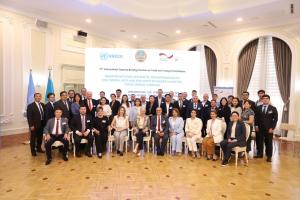Responding to the request of the Governing Council of the United Nations Special Programme for the Economies of Central Asia (SPECA), UNECE is building the capacity of public and private experts in the SPECA participating States to use the semantic standards and reference data models of the UN Centre for Trade Facilitation and Electronic Business (UN/CEFACT) to support the digitalization of data and document exchange along the Trans-Caspian trade and transport corridor.
When the SPECA Heads of State adopted on 24 November 2023 the Roadmap for Digitalization of Multimodal Data and Document Exchange along the Trans-Caspian Corridor, using United Nations legal instruments and standards, they gave a strong political impetus to the process. Yet, the actual rollout of this roadmap requires a strong capacity-building component.
To that end, and together with the German agency for international cooperation GIZ and the Transport Corridor Europe Caucasus Central Asia (TRACECA), on 11-12 June UNECE brought together experts from the SPECA and Trans-Caspian corridor countries to promote the understanding of and skills to implement UN/CEFACT standards.
Hosted in Kazakhstan’s port city of Aktau, at the heart of the Trans-Caspian trade and transport route, the seminar focused on the following objectives. First, it clarified the expected efficiency gains from digitalization of cargo information flows along the corridor. Second, it formulated, based on current efforts and pilot projects, what the countries and various stakeholders should do to digitalize multimodal data and document exchange along the Trans-Caspian corridor, namely address the problem of fragmentation of digitalization projects, national and modal legal regimes, as well as different syntaxes.
Furthermore, the seminar explored the results of a pilot testing project, led by TRACECA, on the digitalization of the CIM/SMGS railway consignment note. Experts presented the specifics of developing a prototype of the electronic CIM/SMGS and its testing as a best practice experience that may be multiplied in other areas.
The seminar defined further steps in this pilot project, namely integrating the electronic document exchange with the IT systems of national railways in five countries along the corridor: Azerbaijan, Georgia, Kazakhstan, Türkiye, and Ukraine. This project should be combined with pilot projects in other modes of transport to achieve multimodal interoperability, for example with a focus on data and document exchange between Caspian ports using UN/CEFACT standards.
The participants also took interest in the discussion on establishing electronic platforms to support multimodal interoperability and create a market for digitalization services. One of the sessions focused on the role of Port Community Information Services as hubs supporting multimodal electronic data exchange.
The participants requested drafting a guideline on what should be done to use the UN/CEFACT standards in upcoming digitalization projects in cross-border supply chains. They were also informed about the new Convention on the Contract of International Carriage of Goods by Rail.
These UNECE capacity-building efforts are timely and complementary with the ongoing initiatives of other development partners, including the European Union, to enhance sustainable transport connectivity in Central Asia.
Note to editors
The United Nations Special Programme for the Economies of Central Asia (SPECA) was launched in 1998 to strengthen subregional cooperation in Central Asia and facilitate its integration into the world economy. The SPECA participating States are Afghanistan, Azerbaijan, Kazakhstan, Kyrgyzstan, Tajikistan, Turkmenistan, and Uzbekistan. UNECE and the United Nations Economic and Social Commission for Asia and the Pacific (UNESCAP) jointly provide overall support and coordination to the programme on the principle of annual rotation. Find out more here.
